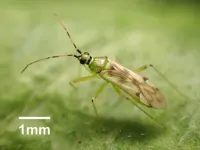(Press-News.org) New research identifies for the first time the genes that help plants grow under stressful conditions - with implications for producing more sustainable food crops in the face of global climate change.
Led by the University of East Anglia (UEA), the study reveals the genes that enable plants to make a novel anti-stress molecule called dimethylsulfoniopropionate, or DMSP. It shows that most plants make DMSP, but that high-level DMSP production allows plants to grow at the coast, for example in salty conditions.
The research also shows that plants can be grown under other stressful conditions, such as drought, when either they are supplemented with DMSP or plants are created that make their own DMSP. Such an approach may be of particular benefit in nitrogen-poor soils to improve agricultural productivity.
This is the first study to describe the genes that plants use to produce DMSP, identify why plants make this molecule, and discover that DMSP can be used to improve the stress tolerance of plants.
The findings are published today in the journal Nature Communications.
Prof Jon Todd, of UEA’s School of Biological Sciences, said: “Excitingly, our study shows that most plants make the anti-stress compound DMSP, but that the saltmarsh grass Spartina is special due to the high levels it accumulates. This is important because Spartina saltmarshes are global hotspots for DMSP production and for generation of the climate-cooling gas dimethylsulfide through the action of microbes that breakdown DMSP.”
Lead author Dr Ben Miller, also from UEA’s School of Biological Sciences, added: “This discovery provides fundamental understanding about how plants tolerate stress and offers promising avenues for improving the tolerance of crops to salinity and drought, which is important for enhancing agricultural sustainability in the face of global climate change.”
The research team included scientists from UEA’s School of Biological Sciences, School of Chemistry, Pharmacy and Pharmacology, and Ocean University of China.
They studied a species of saltmarsh cordgrass - Spartina anglica - that produces high levels of DMSP and compared its genes with those from other plants that produce the molecule, though mainly at low concentrations.
Many of these low DMSP-accumulating species are crop plants that cover large areas in the UK, such as barley and wheat.
The researchers identified three enzymes involved in the high-level production of DMSP in Spartina anglica.
DMSP plays crucial roles in stress protection and is integral to global carbon and sulfur cycling, as well as the production of climate-active gases.
Saltmarsh ecosystems, particularly those dominated by Spartina cordgrasses, are hotspots for DMSP production due to these plants being able to synthesize unusually high concentrations of the compound.
The research was funded by the Natural Environment Research Council (NERC) and the Biotechnology and Biological Sciences Research Council (BBSRC).
‘Elucidation of Spartina dimethylsulfoniopropionate synthesis genes enables engineering of stress tolerant plants’, is published in Nature Communications on October 9, 2024.
END
Researchers discover how plants produce a novel anti-stress molecule
2024-10-09
ELSE PRESS RELEASES FROM THIS DATE:
You get your energy from your mom. A new study explains why
2024-10-09
It’s one of the basic tenets of biology: We get our DNA from our mom and our dad.
But one notable exception has perplexed scientists for decades: Most animals, including humans, inherit the DNA inside their mitochondria —the cell’s energy centers – from their mothers alone, with all traces of their father’s mitochondrial genome destroyed the moment sperm joins egg.
A new University of Colorado Boulder study published Oct. 4 in the journal Science Advances sheds new light on why this happens, showing that when the process fails, and paternal mitochondria slips into a developing embryo, it can lead to lasting neurological, behavioral and reproductive ...
Our food system is broken and we only have 60 harvests left, researchers warn
2024-10-09
Plant-based diets, compassionate agriculture, Indigenous methods, consumer pressure, new laws, international agreements and even vegan pets – these are the solutions for fixing our broken food and farming systems, say dozens of environmental advocates, researchers, farmers and industry pioneers in a new book.
Editors Joyce D’Silva and Carol McKenna sound the alarm in their introduction to Regenerative Farming and Sustainable Diets, warning that ‘our food system is broken’. Radical change is needed, they say, in our world where one‑third of food is lost or wasted, 780 million people ...
Viruses are teeming on your toothbrush, showerhead
2024-10-09
Step aside tropical rainforests and coral reefs — the latest hotspot to offer awe-inspiring biodiversity lies no further than your bathroom.
In a new Northwestern University-led study, microbiologists found that showerheads and toothbrushes are teeming with an extremely diverse collection of viruses — most of which have never been seen before.
Although this might sound ominous, the good news is these viruses don’t target people. They target bacteria.
The microorganisms collected in the study are bacteriophage, or “phage,” a type of virus that infects and replicates inside of bacteria. Although researchers know little about them, phage recently ...
Can weight-loss surgery help prevent pancreatic cancer in people with obesity?
2024-10-09
Obesity and type 2 diabetes are risk factors for various malignancies, including pancreatic cancer, which has a high death rate. A new analysis in Diabetes/Metabolism Research and Reviews suggests that weight-loss surgery—also called metabolic-bariatric surgery—may lower the risk of developing pancreatic cancer in people with obesity, especially in those who also have type 2 diabetes.
In the systematic review and meta-analysis, investigators identified 12 relevant studies that explored the effects of metabolic-bariatric surgery on pancreatic cancer incidence, with a total of 3,711,243 adults ...
Octopus-inspired adhesive works well in wet conditions
2024-10-09
In research published in Advanced Science, investigators drew inspiration from the octopus to develop an adhesive that achieves strong attachment and controlled release on varied substrates in wet and underwater environments. The feat could have numerous applications in fields ranging from healthcare and underwater robotics to infrastructure repair.
By studying the octopus’s suckers—specifically, the exposed disc-like portion called the infundibulum—the researchers designed an elastic, curved stalk with a membrane that can change its shape ...
Can adrenaline auto-injectors prevent fatal anaphylaxis?
2024-10-09
Individuals at risk of anaphylaxis—an acute systemic hypersensitivity reaction to an allergen or trigger, typically associated with skin reactions, nausea/vomiting, difficulty breathing, and shock—are often prescribed adrenaline (epinephrine) autoinjectors such as EpiPens. A recent review published in Clinical & Experimental Allergy finds that these autoinjectors, which people use to self-administer adrenaline into the muscle, can deliver high doses of adrenaline into the blood, but these levels are short-lived and may not be sufficient to save lives in cases of fatal anaphylaxis.
Investigators noted that data from animal and human studies ...
Insects from the bodies of illegally hunted rhinoceros may provide valuable forensic information
2024-10-09
New research in Medical and Veterinary Entomology reveals that when rhinoceros are found dead after being illegally killed by poachers, analyzing insects on the decomposing body aids in estimating the time since death. This information has been used by investigators and officials to construct cases against suspected perpetrators.
The study included 19 rhinoceros that were illegally killed and dehorned in the Republic of South Africa between 2014 and 2021. Scientists collected 74 samples of insect evidence from these rhinoceros remains, ...
Does outdoor play help protect toddlers against later childhood obesity?
2024-10-09
New research published in Acta Paediatrica suggests that children who engage in outdoor play during their preschool years have a lower risk of developing obesity later in childhood.
The study included children born in Japan during two weeks in January and July 2001. Of 53,575 children born, 42,812 had data on outdoor play habits at age 2.5 years. In a survey, parents were asked, “Where do your children usually play (excluding home residences and daycare centers attended)?” Available options for answers included “in my garden or on the grounds of my apartment complex,” “in parks,” “in natural areas such as ...
Caffeine is a heart-healthy habit
2024-10-09
A new paper in Rheumatology, published by Oxford University Press, finds that consuming more caffeine may improve heart health.
Vascular disease, damage of blood vessels, and their resulting consequences, heart attack and stroke, are among the leading causes of death in the general population. In patients with inflammatory rheumatic diseases, such as lupus and rheumatoid arthritis, these risks are even much higher. This is both due to the diseases themselves and some of the treatments for them, particularly cortisone derivatives.
Until ...
Symbiotic bacterium Rickettsia affects the reproduction of a predatory insect, an effective biological control agent for agricultural pests
2024-10-09
Many insects are naturally infected with symbiotic bacteria, which are typically transmitted vertically from mother to offspring but are not transmitted horizontally. Understanding the effects of these symbionts is important in terms of insect pest management as they can significantly affect the biology and reproduction of insects. The predatory mirid bug, Nesidiocoris tenuis, which preys on agricultural pests such as whiteflies and thrips, is an important biological control agent. Although the symbiotic bacterium Rickettsia is often found in N. tenuis, its effects on the host have not been clarified.
A research team led by NARO and the University of Miyazaki has revealed that Rickettsia ...




